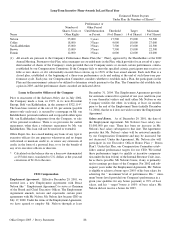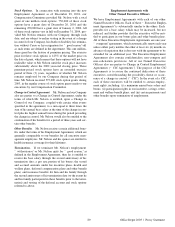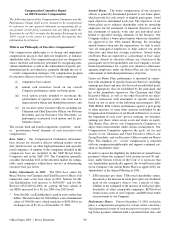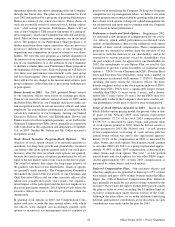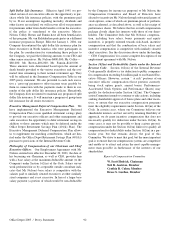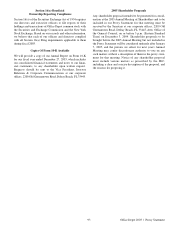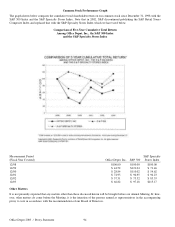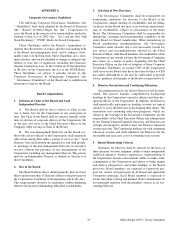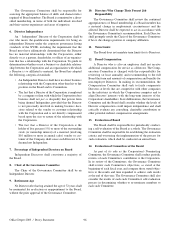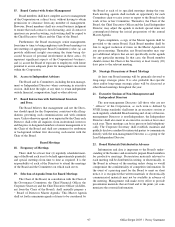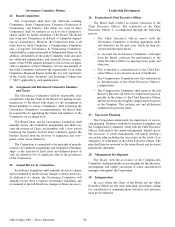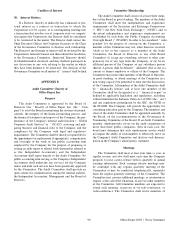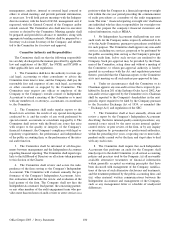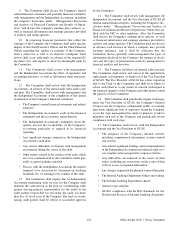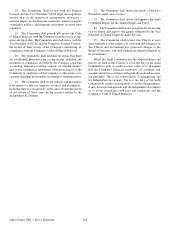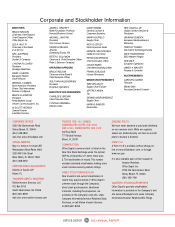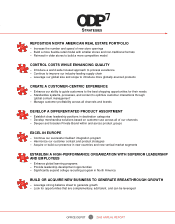Office Depot 2003 Annual Report Download - page 100
Download and view the complete annual report
Please find page 100 of the 2003 Office Depot annual report below. You can navigate through the pages in the report by either clicking on the pages listed below, or by using the keyword search tool below to find specific information within the annual report.Office Depot 2003 / Proxy Statement 98
Governance Committee Matters
23. Board Committees
The Corporation shall have the following standing
Committees: Audit, Compensation, Corporate Governance &
Nominating, and Finance. The duties for each of these
Committees shall be outlined in each of the Committee’s
charter and/or by further resolution of the Board. The Board
may form new Committees or disband a Committee depend-
ing on circumstances. However, the Corporation must at all
times have an Audit Committee, a Compensation Committee
and a Corporate Governance & Nominating Committee,
which shall be composed entirely of Independent Directors. In
addition, all members of the Audit Committee shall also meet
the additional independence and financial literacy require-
ments of the NYSE adopted pursuant to the Act that are appli-
cable to members of that Committee. At least one member of
the Audit Committee shall meet the requirements of an Audit
Committee Financial Expert under the Act and regulations
of the United States Securities and Exchange Commission
(“ SEC”) applicable to such qualifications.
24. Assignment and Rotation of Committee Members
and Chairs
The Governance Committee shall be responsible, after
consultation with the Chair of the Board, for making recom-
mendations to the Board with respect to the assignment of
Board members to various Committees. After reviewing the
Governance Committee’s recommendations, the Board shall
be responsible for appointing the Chairs and members to the
Committees on an annual basis.
The Board Chair and the Governance Committee shall
annually review the Committee assignments and shall con-
sider the rotation of Chairs and members with a view toward
balancing the benefits derived from continuity against the
benefits derived from the diversity of experience and view-
points of the various Directors.
The Corporation is committed to the principle of periodic
rotation of Committee assignments and Committee Chairman-
ships, as the infusion of fresh ideas and different points of
view are deemed to be of significant value to the governance
of the Corporation.
25. Annual Review by Committees
Each Board Committee shall annually review its charter
and recommend to the Board any changes it deems necessary.
In addition to its charter, the Governance Committee will
annually review these Corporate Governance Guidelines and
recommend to the full Board any changes it deems necessary.
Leadership Development
26. Evaluation of Chief Executive Officer
The Board shall conduct an annual evaluation of the
Chief Executive Officer. The evaluation of the Chief
Executive Officer is accomplished through the following
process:
•The Chief Executive Officer meets with the
Governance Committee to develop appropriate goals
and objectives for the next year, which are then dis-
cussed with the entire Board.
•At year-end, the Governance Committee, with input
from the Board, evaluates the performance of the
Chief Executive Officer in meeting those goals and
objectives.
•This evaluation is communicated to the Chief Exe-
cutive Officer at an executive session of the Board.
•The Compensation Committee uses this evaluation in
its determination of the Chief Executive Officer’s
compensation.
•The Compensation Committee shall report to the full
Board of Directors all forms of compensation paid (or
payable in the future) to the Chief Executive Officer
and the next four most highly compensated executives
of the Company. This includes any and all deferred
compensation payment plans.
27. Succession Planning
The Corporation understands the importance of succes-
sion planning. Therefore, both the Governance Committee and
the Compensation Committee, along with the Chief Executive
Officer, shall analyze the current management, identify possi-
ble successors to senior management, and timely develop a
succession plan including the succession in the event of an
emergency or retirement of the Chief Executive Officer. The
plan shall then be reviewed by the entire Board, and reviewed
periodically thereafter.
28. Management Development
The Board, with the assistance of the Compensation
Committee, shall periodically review the plans for the education,
development, and orderly succession of senior and mid-level
managers throughout the Corporation.
29. Interpretation
In cases where the Chair of the Board and the Chief
Executive Officer are the same individual, procedures calling
for consultation or communications between such positions
need not be followed.


